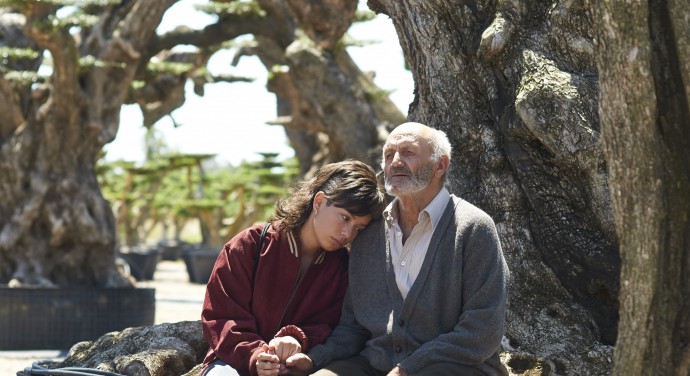Availbale on Dual-Format Blu-Ray/ DVD now
Millennials get a bad press from all sides at the moment, so it’s refreshing to see a film that celebrates youthful idealism, even if that very idealism is destined to be somewhat pruned by harsh pragmatism. That this tale of working class life jamming a spoke into the corporate machine comes from the pen of Paul Laverty, frequent collaborator with Ken Loach and scribe of Jimmy’s Hall and I, Daniel Blake, should come as no surprise. Sadly, there isn’t enough else here to temper the earthy sentimentalism so present in his work.
Alma (a spirited, impish Anna Castillo) works on her family chicken farm. She dotes on her ailing grandfather, who hasn’t spoken for years since his ancient, beloved olive tree was uprooted and sold to fund a new venture financial steamrolled by the global market crash. Enlisting the help of friend and admirer Rafa, and uncle Alcachofa through false pretences, she travels across Europe on a quixotic road trip to retrieve the tree and, she believes, cure her granddad.
The Olive Tree is rife with symbolism about the links between generations and the ties between humanity and nature. However, it is so well-meaning and on-the-nose that it’s difficult to watch without the occasional wince at its explicit naivety. This isn’t so much the fault of the direction from Bollaín. Her depiction of rural struggle is evocative, and she elicits a performance from Castillo that errs on the right side of irritating. It’s the writing that lacks the necessary subtlety; feeling somewhat manipulative and therefore grudging of any tears it pummels from the viewer. Bollaín’s compatriot Asier Altuna covered similar themes of the spiritual link between the land and those who dwell on it more successfully in the surreal, hypnotic Amama.
The road movie section is fun enough, if loaded with the standard tropes from this type of film. The three actors play off each other well, and Laverty is of course gifted at conveying a sense of naturalism in his writing. It’s just a case that his characterisation is better than his storytelling here. When the tree is revealed to have been sold to a German corporation that is using it as a logo to imply its green credentials, it loses its way amidst a studiedly rousing environmentalist finale that is way too simplistic (there is nothing to suggest the company doesn’t take its claim seriously).
It’s easy to be so sniffy about a film that wears its heart so firmly in its sleeve, and it’s not averse to preaching a harsh lesson, but The Olive Tree isn’t quite pragmatic enough in its outlook to be a success.
